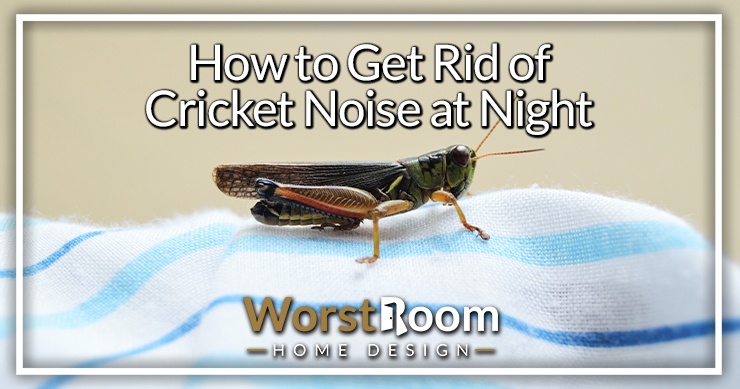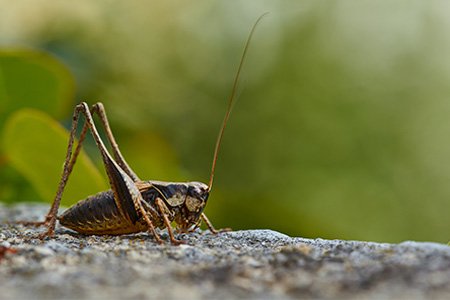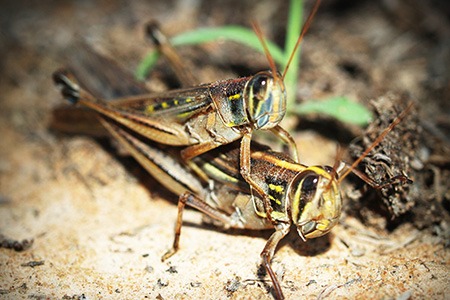How to Get Rid of Cricket Noise at Night
Author: Anne Cowart | Editor: Omar Alonso
Review & Research: Jen Worst & Chris Miller

Crickets can make a symphony’s worth of noise. Sometimes it can be pleasant and comforting. But if it is relentless, too loud, or too close, especially at night, it can become unbearable. It might make you wonder how to get rid of cricket noise at night.
Soon, you’ll be able to rest easily. Here we'll cover many ways you can stop crickets from disturbing your rest. We’ll start by looking inside your home to see what you can do, and then we’ll turn our attention to the crickets themselves.
Why Do Crickets Make Noise at Night?

To get something to change, it’s a good idea to try to understand it first. So when it comes to figuring out how to stop crickets from chirping, it’s worth identifying why crickets make the noise they do.
Crickets are nocturnal creatures. This fact means that they are generally more active at night. And this is one reason why you’ll hear them more often after the sun goes down. That’s when they’re living their life.
The noise is part of a routine that nearly every animal can relate to. Male crickets are trying to find a mate. By rubbing together their wings, the motion creates a loud noise that attracts females for mating. It can also be a way to ward off other males and protect territory.
Not all types of crickets make noise. And the belief that it comes from their legs is a common misconception. But for the crickets that do make noise from their wings, the noise can be surprisingly loud, rivaling that of a small combustion engine.
There’s no wonder why this can disrupt your sleep. These night-time insects are a noisy bunch.
How To Get Rid of Cricket Noise at Night
Now that we know there’s not much we can change about cricket behavior, it’s time to figure out what steps you can take for how to get crickets to shut up.
We’ll focus on two different approaches. First, we’ll look at things you can use to prevent the noise from disrupting your sleep by focusing on the inside of your home. Second, we’ll turn to the crickets and see if there are ways to put some distance between your bed and their restless wings.
Stop the Noise From Reaching Your Ears

It might seem silly to alter your habits to deal with cricket noise, but it can be a great way to go about it. By making a quick change, you can sleep soundly even if the crickets are making a racket outside.
White Noise Machines
Adding a bit of background noise to the mix might seem counterintuitive. Why would you want to battle noise with more noise? In reality, it can be the perfect way to find quality rest.
While noise machines can supply a calming soundtrack to help you sleep. Many machines include the usual white noise, plus sounds like rain, waterfall, and other natural sounds. Some apps transform a phone or tablet into a white noise machine too.
If you play around with white noise machines or apps, you might find one that does an excellent job covering up cricket noise. And just like that, you can go back to uninterrupted sleep.
Earplugs, Hearing Protection, & Headphones
Another method to use for how to get rid of cricket noise at night is to focus on your ears. You can stop noise from coming in through earplugs or other hearing protection devices.
These can be a bit annoying to sleep with but might be perfect for allowing you to fall asleep.
Or you can put on noise-canceling headphones. These come in over-the-ear designs and in-ear buds. Once again, it might be excessive to sleep the entire night wearing these. But they can be a good way to relax enough so you can fall asleep.
Sound-Dampening Material
Getting a small noise machine or using hearing protection is easy enough. But it also either adds more noise to your environment or forces you to put something on or in your ears for the night. That’s not ideal.
Instead, you can use sound-deadening and soundproofing material to help create a noise-free space. Or at least one with less noise. These materials are surprisingly affordable and efficient.
Adding insulation to the area around your bed or exterior walls that lets the noise through can make a major difference.
Windows can be a weak point for sound entry. To deal with them, you’d either need an expensive replacement or block the view with potentially unsightly sound-dampening material. Another option is to move the bed away from the windows if you have the space.
Get Rid of the Crickets

Now that we’ve gone over ways to change the inside of your home, it’s time to look directly at the problem. How to get rid of cricket noise at night? How to get a cricket to stop chirping? Get rid of the crickets.
Tidy Up Around the Home
Crickets are insects. Since they are smaller and some animals try to eat them, they like to be able to hide and blend in. If you give them areas to hide, they’ll take advantage of those. If you have ants in your carpet and on your countertops, then you probably have an environment that's welcoming to crickets, too.
The obvious first place to look is around the inside of your home. If crickets are inside, try to identify how they get in and what attracts them. Sometimes pet food, certain fertilizers, and other items might attract crickets. And unsealed door frames or windows might be an easy entry point. You can find these tiny bugs in your bathroom, kitchen, any cabinets, etc.
Also, check around the outside of your sleeping space. Do you use the immediate area to store anything, such as lawn maintenance equipment? Are there items that you could move away from your sleeping space? Take them to a different location and see if the noise changes.
It’s also worth ensuring that you regularly mow the area around your home. Keeping the grass on the shorter end might get some crickets to leave and find better hiding. Even just using a leaf blower regularly might help.
Attract Cricket Predators

Many pet owners know that crickets can make excellent food for certain animals. You can leverage this fact by attracting crickets’ natural predators. It should work with all types of grasshoppers, too, since that may be what's making the noise bothering you.
Exactly what you want to attract depends on your specific environment. In some places, a bird feeder can go a long way. The birds will swoop in and help clean up the insects they can spot. Just don't place the bird feeder or bird bath too close to your home or you'll be dealing with how to keep birds off your porch next.
Frogs are another one of crickets’ natural predators. If you have the space, resources, and desire, you could bring in some frogs. Building a small water feature would help to provide many frogs with a suitable environment.
Cats are pretty incredible hunters, even at night. If you can have a cat roam around the area near your sleeping quarters, it might help reduce the cricket population. The only catch is that cats can also go for birds and other creatures that would also hunt crickets.
Bring In Pest Control

You don't need to get a noise complaint by screaming at crickets in the middle of the night. If all else fails, it’s time to bring in the big guns. Pest control companies are experts at dealing with all sorts of different problems. And many will have specific ways to handle cricket issues.
If crickets are inside your home, it’s a good idea to jump on the problem quickly and call in the experts right away. They can help you identify what’s allowing them to get in and why they want to do so. And pest control can help come up with solutions and implement them.
Many pest control services will also help reduce the number of crickets in your outside spaces. They can identify problematic areas, come up with potential changes, and even use select chemicals to get rid of crickets.
When trying to figure out how to get crickets to stop chirping, bringing in the experts might be a necessary step. The best answer for how to get rid of cricket sounds is to get rid of the crickets, unfortunately for them.
That’s How To Get Rid of Cricket Noise at Night
You can try to change your sleeping arrangement to stop the noise from keeping you awake. White noise machines, earplugs, and sound-deadening material can help you transform your sleeping space, regardless of the cricket noise from outside.
If that doesn’t work, go directly to the source. You can try to make some small changes to make certain areas less attractive for crickets, bring in a natural predator, or call in expert pest control services.
If you want to discover how to get rid of cricket noise at night, it’s worth being open to the many options available. We've laid it all out above for you.




